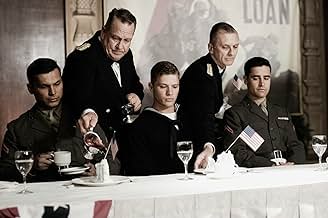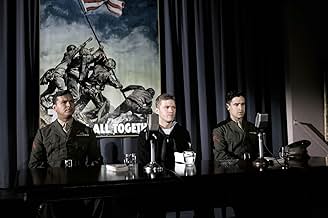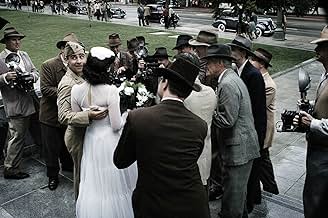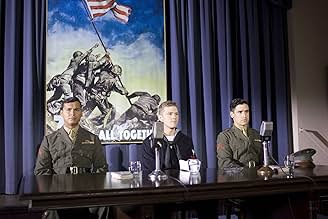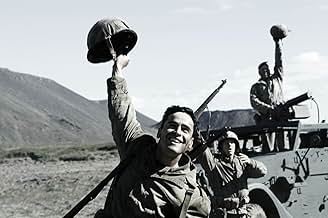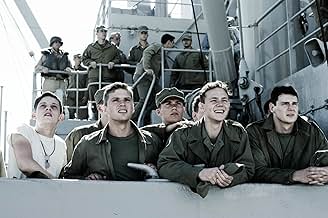The life stories of the six men who raised the flag at the Battle of Iwo Jima, a turning point in World War II.The life stories of the six men who raised the flag at the Battle of Iwo Jima, a turning point in World War II.The life stories of the six men who raised the flag at the Battle of Iwo Jima, a turning point in World War II.
- Nominated for 2 Oscars
- 16 wins & 28 nominations total
Featured reviews
(My Comment) The film was based on the book written by Doc's son, James Bradley. It wasn't until his father's death that he found out that Doc was one of the Iwo Jima flag raisers. Soldiers with real combat experiences usually keep their war stories to themselves. Clint Eastwood directed the film, and he didn't pull any punches in the battle scenes, even though the battle for Iwo Jima was considered one of the bloodiest against the Japanese in the Pacific. The only problem I had with the movie was that Eastwood used too many flashbacks that jumped around and made the movie hard to follow. The movie would have been better if Eastwood had gone in chronicle order with some flashbacks. During the battle scenes, you actually see the chaos that soldiers encounter on the battlefield. Overall, I found the story to be realistic and very compelling by not glorifying war. It is a long movie, but the time passes very fast. This film will receive many Oscar nominations. Some of the movie is graphically violent and shows the dark side of war, and the effects war has on our returning soldiers. (Warner Brothers Pictures, Run time 2:12, Rated R) (8/10)
That one picture is said to be the most reproduced picture in the history of photography.
I toured Iwo Jima in 2000 with my father, a private in the 5th Marine Division, who, along with the flag raisers, landed on Iwo Jima on February 19, 1945 -- the opening day of what would be the costliest battle in the history of the U.S. Marine Corps.
I can't say enough good things about the realism of Clint Eastwood's "Flags of our Fathers." Visually, the movie made me think that I was back on Iwo Jima, and emotionally, I felt like I was witnessing what I had been told by Iwo survivors and what I had read in Richard E. Overton's "God Isn't Here: A Young American's Entry into World War II and His Participation in the Battle for Iwo Jima."
James Bradley's book "Flags of our Fathers," is wonderful, and this movie of the same name is very faithful to his book.
But, the editing of the movie takes the viewer through so many flash-backs and flash-forwards that it's hard to keep things straight -- even if you have read the book!
The movie opens with Harve Presnel (I think it was Harve) playing the role of what I thought was a narrator. Later, it looks like he's just one of many people that James Bradley interviewed for his book.
I was expecting some corny things in the movie, like seeing the flag raising picture taking up the full screen in the theater while the Marine Corps Hymn played. That didn't happen. After I heard what I thought was a narrator, I thought that anyone who didn't know what was going on in the movie would probably be kept informed of the not-so-obvious things . . . like it was Howlin' Mad Smith who was demanding, and not getting, additional bombardment of the island; like it was Secretary of the Navy, James Forrestal, who told Howlin' Mad Smith that "...the raising of that flag on Suribachi means a Marine Corps for the next five hundred years." These events were in the movie, but the characters were neither introduced by name in the movie, nor were they described by "the narrator," who seemed to come and go at odd times.
Ira Hayes is a tragic character. It's obvious that Hollywood likes tragic characters just because of all of the attention that he gets in this movie, and because Tony Curtis made a movie about Ira Hayes back in 1961. The actor who plays Ira in this movie is great!
Stephen Spielberg and Clint Eastwood obviously had to tap dance around an "Elephant in the Room" when it came to showing what happened to John Bradley's friend on Iwo Jima. If you've read the book, you know what happened. The movie does a masterful job of bringing the subject up, but not bringing it up in a manner that would offend the squeamish, or, for that matter, bringing it up in a way that would make it impossible to show the movie to a Japanese audience.
The war sequences are skillfully executed. It reminds me of the early sequences of 'Saving Private Ryan' as its shot with washed out colours and the scenes are just as visceral and hard-hitting. They are extremely effective as are the scenes where the three survivors are being paraded by officers in order to sell military bonds. The real truth is ignored, the illusion of a photo is confirmed as truth, the three soldiers are burning in the inside while obliged to parade themselves and then they are left with nothing, just memories of the war. Eastwood has also briefly but effectively tackled the racism theme. Even the label of a hero was not enough for Hayes to get a drink at a bar.
Haggis's writing is solid. War isn't glorified and the aftereffects are shown with subtlety rather than blatant preaching. The editing is tight as the movie flows at a smooth pace. It starts off with the war sequences and then follows the three surviving flag-raisers revisiting the war in flashbacks. Eastwood's soundtrack is intense and gives voice to the unspoken words. All the performances are good but it is Jesse Bradford, Adam Beach and Ryan Phillipe who stand out as the three survivors, particularly Phillipe who is restrained.
'Flags of Our Fathers' an important side of the war that almost vanished into oblivion but thanks to Eastwood and his team, many people today will know about it.
Did you know
- TriviaThe story about the flag raising being posed was true. It was started, ironically, by Joe Rosenthal. He did not know he had taken the famous photograph until he returned to the States. He did, however, take a second photograph of the five Marines and one Navy Corpsman gathered around the flag. When people asked if he had posed the photograph, he, thinking they were referring to the second photograph said "Of course". It was only after seeing the first photograph that he realized they were referring to that photograph and not the second one.
- GoofsIn explaining the importance of a successful bond drive, the treasury representative says that the fuel dumps are empty and "our Arab friends only take bullion." At the time of World War II, America was essentially self sufficient in oil production and not dependent on Arab oil. While oil was discovered in some Arab countries before the war, it was not extensively developed until after the war.
- Quotes
[last lines]
James Bradley: I finally came to the conclusion that he maybe he was right. Maybe there's no such thing as heroes. Maybe there are just people like my dad. I finally came to understand why they were so uncomfortable being called heroes. Heroes are something we create, something we need. It's a way for us to understand what's almost incomprehensible, how people could sacrifice so much for us, but for my dad and these men, the risks they took, the wounds they suffered, they did that for their buddies. They may have fought for their country but they died for their friends. For the man in front, for the man beside him, and if we wish to truly honor these men we should remember them the way they really were, the way my dad remembered them.
- Crazy creditsThere is an additional short sequence after the credits have ended.
- SoundtracksKnock Knock
Written and Performed by Kyle Eastwood, Michael Stevens, Andrew McCormack and Graeme Flowers
Details
- Release date
- Country of origin
- Official sites
- Language
- Also known as
- La conquista del honor
- Filming locations
- Production companies
- See more company credits at IMDbPro
Box office
- Budget
- $90,000,000 (estimated)
- Gross US & Canada
- $33,602,376
- Opening weekend US & Canada
- $10,245,190
- Oct 22, 2006
- Gross worldwide
- $65,900,249
- Runtime2 hours 15 minutes
- Color
- Sound mix
- Aspect ratio
- 2.39 : 1
Contribute to this page








